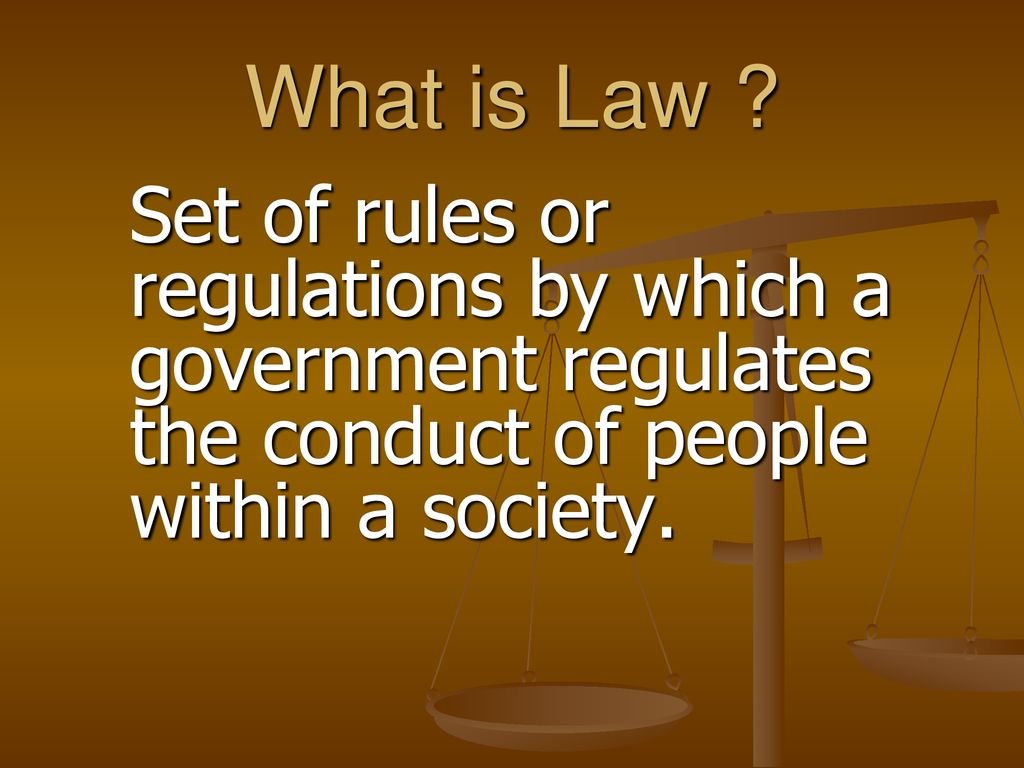
Table of Contents
What is law ? ( introduction )
Law is a complex system of rules and regulations that guides societies, ensuring order, justice, and harmonious interactions. Originating from ancient customs and evolving into codified codes, law establishes rights, responsibilities, and consequences within communities. It safeguards individual rights and freedoms, while also outlining societal duties. Law serves as a means of resolving conflicts through courts and dispute resolution methods, maintaining social order through criminal regulations, and upholding equality by treating all individuals impartially. Comprising branches such as constitutional, civil, criminal, administrative, and international law, it shapes interactions, preserves ethical behavior, and provides a framework for just governance. In essence, law’s historical evolution and multifaceted roles make it the cornerstone of organized societies, ensuring fairness and structure in human affairs.
Types of law
Law is a multifaceted field that encompasses various branches, each addressing specific aspects of human interactions and governance. Here are some of the main types of law:
- Constitutional Law: This branch pertains to the fundamental principles and structure of a country’s government. It outlines the powers and functions of different branches of government, as well as the rights and freedoms of citizens.
- Criminal Law: Criminal law deals with offenses against society. It defines what constitutes a crime, the elements of various crimes, and the penalties for committing them. It also includes the legal process for investigating, prosecuting, and punishing offenders.
- Civil Law: Civil law regulates disputes between individuals, organizations, or entities. It covers areas such as contracts, property disputes, family matters, and personal injury cases. The goal of civil law is to provide remedies and compensation to those who have been wronged.
- Administrative Law: This branch governs the activities and decisions of administrative agencies, departments, and regulatory bodies. It ensures that government actions are fair, reasonable, and within the bounds of the law.
- International Law: International law governs relations between countries, international organizations, and individuals on a global scale. It covers treaties, diplomatic immunity, human rights, and issues related to international conflicts.
- Family Law: Family law deals with legal matters related to families and domestic relationships. This includes divorce, child custody, adoption, marriage, and issues pertaining to domestic partnerships.
- Environmental Law: Environmental law focuses on regulations and policies aimed at protecting the environment. It covers areas like pollution control, conservation, land use, and natural resource management.
- Contract Law: Contract law governs agreements between parties. It establishes the terms and conditions of contracts, enforces their obligations, and provides remedies in case of breaches.
- Intellectual Property Law: This branch protects intellectual creations such as inventions, artistic works, trademarks, and trade secrets. It includes patent law, copyright law, and trademark law.
- Employment Law: Employment law deals with the legal relationship between employers and employees. It covers issues like workplace discrimination, employee rights, labor unions, and workplace safety.
- Real Estate Law: Real estate law pertains to matters related to property, land, and real estate transactions. It includes buying, selling, leasing, and zoning regulations.
- Tort Law: Tort law addresses civil wrongs or injuries caused by one party to another. It includes cases of negligence, personal injury, defamation, and intentional harm.
These are just a few examples of the diverse branches of law. Each type of law serves a specific purpose in regulating different aspects of human behavior, relationships, and interactions within society.
Nature of law
The nature of law encompasses its fundamental characteristics, principles, and functions within a society. It reflects the essence of how law operates, its sources, purposes, and effects. Understanding the nature of law is essential to grasp its role in shaping human behavior and maintaining order. Here are some key aspects of the nature of law:

- Normative System: Law is a normative system that establishes rules and standards for human conduct. It sets guidelines for acceptable behavior and prescribes consequences for violations.
- Social Order: One of the primary purposes of law is to maintain social order. It provides a framework that enables individuals and groups to coexist harmoniously by regulating their interactions and resolving conflicts.
- Authority and Enforcement: Law derives its authority from the governing body or institution that creates and enforces it. The state, through its legal institutions, ensures compliance with the law and metes out penalties for non-compliance.
- Binding and Obligatory: Law is binding and obligatory for those subject to its jurisdiction. Individuals and entities are expected to adhere to the law’s requirements, and failure to do so can lead to legal consequences.
- Prescriptive and Prohibitive: Law is both prescriptive, instructing people on how to act in certain situations, and prohibitive, specifying actions that are forbidden or restricted.
- Flexibility and Evolution: Law is not static; it evolves over time to adapt to changing societal norms, technological advancements, and cultural shifts. Legal systems incorporate precedents and amendments to remain relevant.
- Protection of Rights: Law safeguards individual rights and freedoms while balancing them with the welfare of the community. It ensures that citizens are treated fairly and equitably under the legal framework.
- Certainty and Predictability: Law provides certainty and predictability by establishing consistent rules and standards. This predictability fosters trust in the legal system and encourages compliance.
- Judicial Process: Law includes mechanisms for resolving disputes, often through a judicial process. Courts interpret and apply the law to specific cases, ensuring that justice is served and conflicts are resolved.
- Hierarchy of Norms: In many legal systems, laws exist within a hierarchy. Constitutional laws are supreme, followed by statutory laws, regulations, and case law.
- Cultural and Historical Context: The nature of law is often influenced by cultural, historical, and societal contexts. Legal systems may reflect the values and traditions of a particular society.
- Instrument of Change: Law can be a powerful tool for social change. It has been used to challenge discriminatory practices, promote equality, and advance human rights.
In summary, the nature of law encompasses its role in establishing rules, maintaining order, protecting rights, and serving as a foundation for a just society. It operates as a normative system with binding authority, adapting to societal changes while ensuring predictability and fairness. Through its enforcement, interpretation, and evolution, law plays a pivotal role in shaping human interactions and defining the boundaries of acceptable behavior.
also gain some information aboutThe best places to visit in Odisha :Top places
Features of law
Law possesses several distinctive features that collectively define its nature and role within societies. These features provide structure, clarity, and a framework for maintaining order and justice. Here are some key features of law:
- Binding Authority: Law has binding authority over individuals and entities within a specific jurisdiction. It prescribes rules and regulations that must be adhered to, and failure to comply can lead to legal consequences.
- Rule of Recognition: Legal systems often have a “rule of recognition,” which designates the criteria for identifying valid laws within a particular jurisdiction. This ensures that laws are consistently applied and recognized as legitimate.
- Normative Function: Law sets norms and standards for acceptable behavior. It prescribes actions that are required or prohibited, guiding individuals in their interactions and activities.
- Enforceability: One of the essential features of law is its enforceability. Legal systems have mechanisms in place to ensure compliance, such as courts, law enforcement agencies, and penalties for violations.
- Prescriptiveness: Law is prescriptive, meaning it provides guidance on how individuals should act in various situations. It specifies obligations, rights, and responsibilities, offering a framework for decision-making.
- Prohibition: In addition to prescribing certain behaviors, law also prohibits actions that are deemed harmful, dangerous, or detrimental to society. Prohibitions are meant to maintain order and protect the well-being of individuals and the community.
- Sanctions: Law introduces sanctions or consequences for non-compliance. These can include fines, imprisonment, community service, or other penalties, which discourage individuals from violating legal norms.
- Clarity and Certainty: Laws are generally formulated in clear and precise language to ensure that they can be easily understood and applied. This clarity promotes predictability in legal outcomes.
- Public Interest: Law often reflects the public interest, aiming to promote the welfare of society as a whole. Legal regulations are formulated to address common needs, rights, and concerns.
- Hierarchy: Legal systems often have a hierarchical structure. Constitutional laws, which define the framework of government, hold the highest authority, followed by statutes, regulations, and case law.
- Flexibility: While law provides stability, it also has a degree of flexibility to adapt to changing circumstances. Legal systems may include provisions for amendments and interpretations to remain relevant over time.
- Social Engineering: Law can be used as a tool for social engineering and change. Governments may enact laws to promote certain behaviors, discourage others, and shape societal values.
- Protection of Rights: Law plays a critical role in safeguarding individual rights and freedoms. It ensures that individuals are treated fairly, and their fundamental rights are respected and upheld.
- Dispute Resolution: Law provides mechanisms for resolving conflicts and disputes. Courts and alternative dispute resolution methods offer a platform for parties to seek resolution based on legal principles.
- Cultural and Historical Influence: Legal systems are often influenced by cultural norms, historical developments, and societal values. These factors shape the content and application of laws.
In essence, the features of law collectively establish a system that guides human behavior, maintains order, and promotes justice within a society. These features ensure that law serves as a framework for interactions, provides a sense of accountability, and upholds the principles of fairness and equality.
Importance of law
The importance of law in society cannot be overstated. Law serves as a foundation for order, justice, and the functioning of communities. It provides structure, safeguards individual rights, and ensures that societies operate smoothly and fairly. Here are some key reasons highlighting the importance of law:
- Order and Stability: Law provides a framework that establishes order and stability within societies. It sets clear rules and regulations that govern behavior, reducing chaos and uncertainty.
- Conflict Resolution: Law offers mechanisms for resolving disputes and conflicts in a structured and impartial manner. Courts and legal procedures provide a platform for parties to seek justice and resolve disagreements.
- Protection of Rights: One of the fundamental roles of law is to protect the rights and freedoms of individuals. It ensures that citizens are treated fairly, equitably, and without discrimination.
- Prevention of Injustice: Law prevents individuals and institutions from acting arbitrarily or unfairly. It ensures that power is exercised within defined limits and that no one is above the law.
- Accountability: Law holds individuals, organizations, and governments accountable for their actions. It establishes legal consequences for wrongdoing, discouraging unethical behavior.
- Predictability: Law creates a predictable environment where individuals and businesses can plan their actions with confidence. Clear rules and regulations allow for informed decision-making.
- Economic Development: A stable legal system encourages investment and economic growth. Businesses thrive in environments where contracts are enforceable, property rights are protected, and regulations are transparent.
- Social Justice: Law can address societal inequalities and promote social justice. It can be used to challenge discriminatory practices and promote equal treatment for all members of society.
- Safety and Security: Criminal laws and law enforcement agencies work to ensure the safety and security of citizens by deterring crime, investigating offenses, and punishing wrongdoers.
- Public Welfare: Many laws are designed to protect public welfare by regulating areas such as environmental protection, public health, consumer rights, and workplace safety.
- Individual Empowerment: Legal knowledge empowers individuals to assert their rights and seek remedies when they are wronged. It ensures that even the vulnerable have a means of recourse.
- Democratic Governance: Law underpins democratic governance by defining the powers and limitations of governments. It ensures that rulers are accountable to the people and that citizens’ rights are respected.
- Cultural Preservation: Law can play a role in preserving cultural heritage and traditions by protecting cultural artifacts, landmarks, and practices.
- International Relations: International law establishes rules for interactions between countries, contributing to peaceful relations, diplomacy, and the resolution of conflicts.
- Ethical Standards: Law often reflects societal values and ethical standards. It codifies behaviors that are considered acceptable or unacceptable, promoting ethical conduct.
In summary, the importance of law lies in its ability to create a just and orderly society where individuals can coexist harmoniously, exercise their rights, and pursue their goals. Law is a cornerstone of civilized societies, providing a structure that safeguards individual freedoms, ensures fairness, and promotes the well-being of communities.
Best law colleges in India
There are several reputable law colleges in India that are known for their quality education and academic excellence in the field of law. It’s important to note that rankings and reputations can change over time, so I recommend checking the latest rankings and reviews before making a decision. Here are some of the top law colleges in India:
- National Academy of Legal Studies and Research (NALSAR), Hyderabad
- National Law School of India University (NLSIU), Bangalore
- The West Bengal National University of Juridical Sciences (WBNUJS), Kolkata
- National Law University (NLU), Delhi
- National Law University (NLU), Jodhpur
- National Law University (NLU), Bhopal
- Gujarat National Law University (GNLU), Gandhinagar
- National Law University (NLU), Mumbai
- Symbiosis Law School, Pune
- NALSAR University of Law, Hyderabad
These institutions are renowned for their faculty, infrastructure, academic programs, and placements. However, it’s recommended that you research and consider factors like the specific law programs offered, faculty expertise, facilities, internships, placements, and location when choosing a law college that suits your preferences and career goals. Additionally, you can consult official college websites, educational guides, and recent rankings to gather up-to-date information.
know aboutHistory of Odisha Politics: Unraveling the Journey of Governance
Best law colleges in Odisha
several notable law colleges in Odisha, India, known for providing quality legal education. Here are a few prominent law colleges in Odisha:
- National Law University Odisha (NLUO), Cuttack: NLUO is a prominent law university in Odisha, known for its comprehensive legal education and research programs.
- KIIT School of Law, Bhubaneswar: Part of KIIT Deemed to be University, this law school offers a range of undergraduate and postgraduate law programs.
- Utkal University, Bhubaneswar: Utkal University’s law department offers various law courses and has a long history of providing legal education in the state.
- Sri Sri University, Cuttack: This university offers law programs with a focus on holistic education and values-based learning.
- IMS Law College, Cuttack: Affiliated with Utkal University, IMS Law College offers undergraduate and postgraduate law programs.
conclusion
In conclusion, law is a fundamental and multifaceted system that plays a pivotal role in shaping societies and human interactions. It provides a structured framework of rules and regulations that govern behavior, ensure order, and promote justice. The nature of law encompasses its binding authority, normative function, and mechanisms for enforcement and conflict resolution. Law’s importance cannot be overstated; it establishes social order, safeguards individual rights, and provides a platform for resolving disputes. Moreover, law contributes to economic development, social justice, and the overall well-being of communities. It empowers individuals, holds institutions accountable, and reflects the values and aspirations of society. As a dynamic and evolving field, law continually adapts to changing circumstances while upholding its core principles of fairness, equality, and predictability. Ultimately, law serves as the cornerstone of a just and organized society, providing a framework for human interactions and the preservation of rights and responsibilities.
FAQs
- What is the purpose of law in society?
Law serves to establish order, provide structure, protect individual rights, resolve disputes, and ensure justice within a society. - How does law contribute to social justice?
Law can address inequalities, protect marginalized groups, and promote equal treatment, thereby contributing to a more just and equitable society. - What is the difference between civil law and criminal law?
Civil law deals with disputes between individuals or entities, while criminal law addresses offenses against society and prescribes penalties for wrongful actions. - What role does the judiciary play in the legal system?
The judiciary interprets and applies the law, resolves disputes, ensures justice, and acts as a check on the legislative and executive branches of government. - How does international law work?
International law governs relations between countries and international entities. It encompasses treaties, conventions, and customary practices that regulate global interactions. - What is the significance of the rule of law?
The rule of law ensures that laws apply equally to everyone, including those in power. It prevents arbitrary actions and promotes a just and accountable society. - How do legal systems adapt to changing societal norms?
Legal systems incorporate amendments, precedents, and reforms to stay relevant in the face of evolving societal values and technological advancements. - What are the fundamental rights protected by the law?
Fundamental rights often include the right to life, liberty, equality, freedom of expression, and protection against discrimination and unfair treatment. - Can law be used as a tool for social change?
Yes, law can be a powerful instrument for promoting social change by addressing discrimination, advocating for human rights, and challenging unjust practices. - How do I choose the right law school for my education?
When selecting a law school, consider factors such as faculty expertise, program offerings, placements, location, and the school’s reputation in the field. - What is the relationship between ethics and the law?
Ethics and law are interconnected but distinct. While law provides a minimum standard of behavior, ethics reflect a higher moral code that guides individual conduct. - How does law ensure accountability of governments and public officials?
Law establishes mechanisms such as checks and balances, oversight bodies, and legal proceedings to hold governments and officials accountable for their actions.
Remember that these are just brief answers to common questions, and the field of law is complex and diverse. If you have more specific questions or need in-depth information on any aspect of law, feel free to ask.






